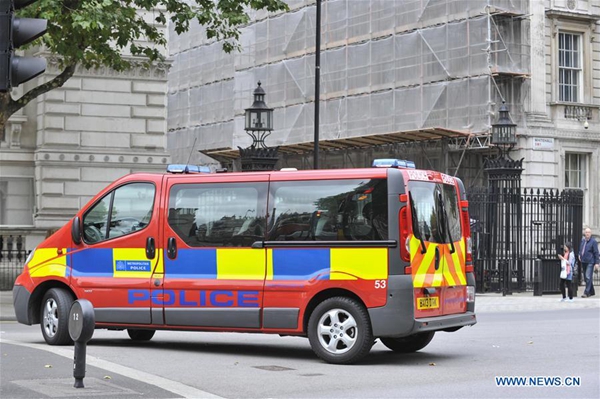London attack and the ongoing fight against terrorism
- By Sajjad Malik
 0 Comment(s)
0 Comment(s) Print
Print E-mail China.org.cn, September 19, 2017
E-mail China.org.cn, September 19, 2017
 |
|
A police vehicle patrols on a street in London, Britain on Sept. 16, 2017. British Prime Minister Theresa May said Friday that the terror threat level is raised to critical, which means a further terrorist attack in Britain may be imminent. [Xinhua/Stephen Chung] |
The authorities fought back by raising the threat level to "critical," requiring more armed police on the streets and more snap checks of individuals and properties. An 18-year-old suspect was taken into custody at Dover allegedly as he was trying to flee to France.
Britain has received messages of sympathy and support after the attack. Donald Trump called Prime Minister Teresa May and pledged cooperation in the fight against extremism and terrorism, the pervasive evils of modern time.
Among European cities, London has suffered most due to terrorism in terms of frequency of attacks. In fact, it could be termed as the most terrorism-hit city of the world if we sift through the record of bombings since the second half of 19th century, when the instigators were Irish activists seeking independence and anarchists. The latest incidents, however, have been blamed on al-Qaeda and Islamic State.
Attacks by Irish republicans during the Fenian Dynamite Campaign (1867-1885) killed several people in London. It followed a relative period of quietude until they sprang up again just before the start of the Second World War.
The Irish Republican Army (IRA) carried out dozens of attacks in London in 1939 as part of a sabotage campaign to disrupt the economic and civic infrastructure. The killing spree fizzled out at the start of 1940 when the flames of the war had engulfed the continent.
The next and longest phase of attacks by the Irish activists started in 1970 when the issue was a demand that Northern Ireland remained British after independence was gained by the Irish Republic. Hundreds of attacks by republican groups in the campaign spanning over three decades repeatedly targeted London. There was a pattern of telephonic warnings before the explosions, which would cause huge disturbances. Some of the calls would end up as hoax, disrupting civil life almost as much.
Disgruntled elements remained active for some years even after the historic Belfast agreement became effective in 1999. However, finally peace won and the violence was defeated and Irish-U.K. ties became normalized.
By the time the Irish trouble ended, the world was already in the grip of terrorism by al-Qaeda and its affiliated networks. The 9/11 incident in America in 2001 pushed the boundaries of unrest far and wide, with British troops fighting in Afghanistan and Iraq side-by-side with the Americans.
The Iraq war was hugely controversial in Britain and elsewhere in the world. There was fear of a policy blowback, and the militants finally struck in July 2005 in Britain. The place was, as usual, London. Since then, this historic city has witnessed senseless bloodshed umpteen times. The latest one was on Saturday.
As the world pours out its sympathy for the British people and especially Londoners, it is time for British leaders to ponder over why this city has faced so much violence in the past 150 years.
Violence is a product of a conflictual relationship between two or more parties. Usually one of them starts targeting civilians as tool to tame the opponent(s). Terrorism is the worst form of violence directed against unarmed people.
The best possible way to avoid direct or indirect violence is to resolve conflicts. History shows that conflicts can be transformed into cooperation. However, for it to happen, the political leadership should take bold decisions.
While the London tube attack reminds us that there is no place on Earth truly immune from the threat of militancy, it also shows that, so far, our response to the global threat has been grossly inadequate. In some cases, the collective and individual reactions have helped to breed more terrorism instead of eliminating it.
It is also wrong to think that terrorism started from 9/11. While it was the single most devastating incident of violence against innocent civilians, thousands of people have died at terrorist hands over centuries.
Yet, we should understand that the modern form of terrorism is distinctive as it is global in reach, impact and consequences. To address it, the world should try to understand extremism and terrorism to the fullest extent and then consider the proper remedies.
The final solution is likely to be created by a mix of local, regional and global measures, but it won’t be easy.
Sajjad Malik is a columnist with China.org.cn. For more information please visit:
http://www.china.org.cn/opinion/SajjadMalik.htm
Opinion articles reflect the views of their authors, not necessarily those of China.org.cn.






Go to Forum >>0 Comment(s)